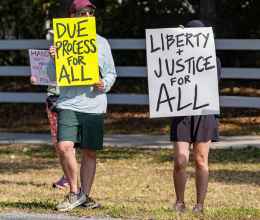
FOR IMMEDIATE RELEASE
Contact: Dotty Griffith, Public Education Director, ACLU Foundation of Texas, (512) 478-7300 x 106 or 923-1909; [email protected]
AUSTIN -- ACLU of Texas Policy Director Rebecca Bernhardt today called upon Texas legislators and law enforcement to focus resources on organized crime and drug-related violence.
In a 33-page report, Laura Martin, ACLU of Texas policy analyst and lead author, described how 11 of 40 participating Texas local law enforcement agencies used Border Star, a $110 million, state-funded effort that is supposed to combat violent crime, drug smuggling and terrorism.
Download the report (PDF)
"As a law enforcement program, Operation Border Star has been a failure because it encourages police and sheriff's departments to measure their success based on everyday policing activities like disorderly conduct," said Martin. "It therefore takes the focus from the program's intended goal of fighting cartel-violence and organized crime."
For example, the Val Verde County Sheriff's Department searched 851 vehicles during 83 days of participation in Operation Border Star, resulting in only one substantial drug seizure of 623 pounds of marijuana and no asset forfeitures. "This used considerable police resources for very little result," said Bernhardt.
"Operation Border Star's performance measures encourage participating agencies to engage in law enforcement activities that do not further the state's goal of improving state-wide public safety and protecting Texas from organized crime," said Bernhardt.
Bernhardt offered these findings and recommendations:
Problem: The Cities of La Joya and Sullivan City, which have between 4,300 and 4,700 residents, and their police departments combined to make 9,576 traffic stops as part of Operation Border Star. The result? 3,314 citations and 5,387 warnings issued. That's roughly one traffic stop per resident.
Recommendation: Measure only criminal activity related to organized crime, target drug corridors and prioritize investigations.
Problem: The virtual border surveillance program operates 13 cameras at this time and a publicly accessible website. Over the first six months of operation, only three arrests were made as a result of $2 million worth of technology.
Recommendation: Abandon inappropriate technology, like the virtual border surveillance program, and provide training and oversight for fusion centers.
Problem: Since 2005, the heads of three Operation Border Star participating departments have been arrested, indicted or convicted of organized crime-related activity.
Recommendation: Create a law enforcement integrity unit in an independent agency to investigate cartel-related corruption.
Problem: Measuring arrests of aliens encourages local law enforcement to detain immigrants instead of arresting gang members. Ten of the 11 departments analyzed in this report utilized Operation Border Star resources to detain 656 suspected deportable immigrants and arrested a combined total of five criminal gang members. El Paso Police Department alone arrested 53 criminal gang members and apprehended and detained no one without documentation. This is evidence that law enforcement efforts will be more effective when they are not bogged down by attempting to verify immigration status.
Recommendation: Drop immigrant apprehensions as a performance measure and add a measure that focuses law enforcement attention on human trafficking.
"Operation Border Star fails to provide meaningful oversight of our $110 million investment," concluded Bernhardt.
Copies of the report will be distributed to state legislators with the goal of improving homeland security-funded operations. Please contact Dotty Griffith for a PDF copy of the report.






